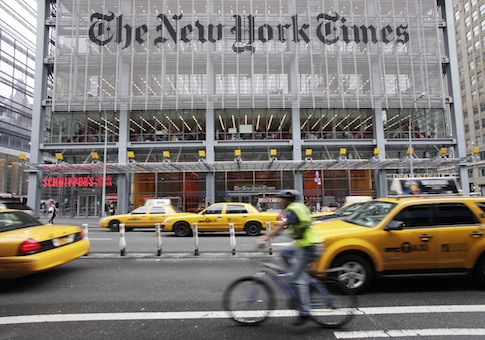When Israel is covered by a writer from the New York Times, it is a safe bet that the writer will go to J Street in search of a stinging quote to drive home the article’s message, according to a Washington Free Beacon analysis.
The liberal anti-Israel lobbying group and its founder Jeremy Ben-Ami have become staples of Times coverage of Israel, which usually features a quote from Ben-ami as the final kicker.
The group has been quoted in nearly 30 New York Times articles since the beginning of 2009 and in more than half of those articles J Street is quoted in the concluding paragraph.
The practice of using J Street and Ben-Ami for kickers has been on the rise in recent weeks.
In a single day on Jan. 29, two different authors both used quotes from Ben-Ami regarding Israeli Prime Minister Benjamin Netanyahu’s invitation to speak to the U.S. Congress.
Here is the conclusion of Jeremy Peters’ "G.O.P.’s Invitation to Netanyahu Is Aiding Obama’s Cause on Iran":
Typically, policy on Israel has been one area where both political parties agree. And some observers said they feared the Netanyahu-Boehner episode was eroding that.
"When that sense of mutual values and interest starts to be driven apart by partisan politics," said Jeremy Ben-Ami, the president of J Street, an Israeli advocacy group, "it works to the long-term harm of the state of Israel."
Appearing on the very same page on Jan. 29 was Julie Hirschfield Davis’ "Administration Official Criticizes Israeli Ambassador Over Netanyahu Visit." Here’s the concluding paragraph:
Critics argued that Mr. Dermer’s actions had harmed the relationship between the United States and Israel in lasting ways. "To be an ambassador, you need to be a representative of your country to the entirety of the other country, and that has not been his role to date," said Jeremy Ben-Ami, the executive director of J Street, a Democratic-aligned pro-Israel group.
In another article on the spat between President Obama and Netanyahu, this one published Monday, J Street is referenced as a "Democratic-leaning pro-Israel group" and used again as the kicker.
American Jewish leaders, including Abraham H. Foxman, national director of the Anti-Defamation League, and Rabbi Rick Jacobs, the president of the Union for Reform Judaism, have warned that the speech could damage the essential relationship between the allies. The Democratic-leaning pro-Israel group J Street collected 20,000 signatures Monday on a petition calling for the cancellation of the speech, a spokeswoman said.
Of the 27 articles since 2009 that Ben-Ami or others from J Street have been quoted in, 16 of them have used J Street as the kicker.
Ben-Ami's quotes are used to leave readers with a pointed statement that contradicts the views of the pro-Israel community.
Here is the kicker for Mark Landler’s March 4, 2012, article "Israel's Backers Pressure Obama On Iran Position," for example:
To counter AIPAC's message, J Street has circulated a video on Capitol Hill, highlighting American and Israeli military experts who have voiced doubts about the efficacy of a strike on Iran.
''We are saying there needs to be time for enhanced sanctions and diplomacy to work,'' said Jeremy Ben-Ami, the president of J Street. ''We're trying to calm down the drumbeat of war.''
In Helene Cooper’s article, "'Loose' War Talk Only Helps Iran, President Says," which was written a day after Landler’s article, a J Street quote is again used in conclusion as a counter to pro-Israel comments.
''The president said some welcome things today on Iran,'' said Josh Block, a former Aipac spokesman, ''including making clear that he has a policy of prevention, not containment, explicitly pointing to a military option, delivering an extended explanation of why it is in America's interest to stop Iran, and in particular making explicitly clear that Israel has a sovereign right to defend themselves as they see fit.''
There was a sharply different reaction at J Street, a prominent pro-Israel lobbying group that is less hawkish. Daniel Levy, a former Israeli peace negotiator, said Mr. Obama ''gave the domestic and mainstream Israeli audiences what they wanted without giving Bibi what he wanted,'' referring to Mr. Netanyahu's nickname. ''He refused to lie down for Bibi.''
Here is the conclusion of Jeff Zeleney’s 2012 article on Republican Sheldon Adelson’s attempts to court Jewish voters:
Jeremy Ben-Ami, the president of J Street, a Jewish lobbying group in Washington that favors Democratic candidates, said the effort by Mr. Adelson and the Republican Jewish Coalition would fall short.
"Every single number indicates there is simply no such thing as a Jewish problem for the president," Mr. Ben-Ami said. "The people who vote only on Israel didn’t vote for Obama last time and know who they are voting for already."
The New York Times helped announce the founding of J Street in April 2008, and its relationship with the group has grown since then. The Times Magazine published an extensive and glowing profile in 2009 of J Street and Ben-Ami and the goal of creating a progressive counterweight to the "Israel lobby."
In addition to profusely quoting J Street, the Times has also published a column by Ben-ami in its op-ed pages and printed at least four of his "letters to the editor" since he founded the group.
Despite the attention the New York Times lavishes on J Street, the paper failed to cover an instance in which a J Street supporter's Toyota Prius was towed in the heart of Washington, D.C.
"J Street and the New York Times are perfect for each other," said Noah Pollak, executive director of the Emergency Committee for Israel, a pro-Israel group. "They're both pretending to be something they're not."
